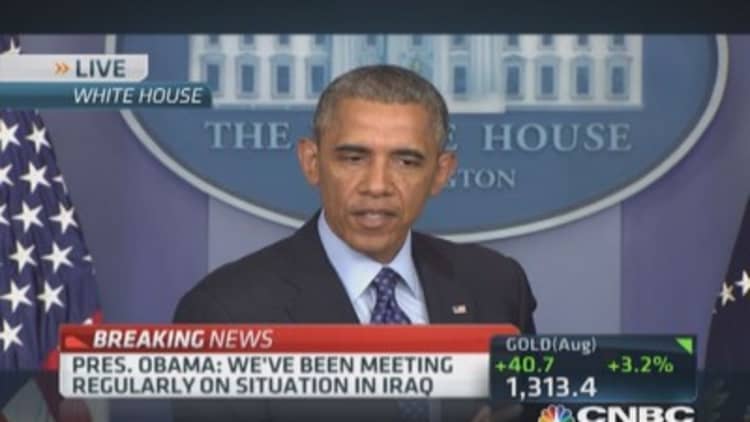As terrorist groups in Iraq and Syria dominate the headlines, the U.S. conducted strikes in Somalia. But rather than some far-afield action, Monday's operation is key to the American counter-terrorism strategy.
The Pentagon announced late Monday that American forces had conducted a strike against al-Shabab, an Islamic extremist group based in Somalia. have indicated that its leader, Ahmed Abdi Godane, was among those targeted, but as of Tuesday afternoon there was no confirmation that he was killed in the attack.
Although much U.S. media and public attention is turned to the counter-terrorism efforts against Islamic State militants in Iraq, experts say that the American actions against al-Shabab are essential for the country's global counter-terrorism efforts.
"We have to see the forest and not only the trees," said Yonah Alexander, a senior fellow at the Potomac Institute for Policy Studies and the director of its International Center for Terrorism Studies. He added that al-Shabab is "one of the most vicious groups around" and that its close ties to al-Qaeda and anti-Western rhetoric more than justify U.S. strikes.
Read More
Al-Shabab has had a fairly limited terror reach, conducting attacks in Somalia, Kenya and Uganda, but it has long expressed a desire to become a transnational group, said Scott Stewart, the vice president of tactical analysis for the geopolitical intelligence firm Stratfor.
The U.S. attacked al-Shabab not only for its current capabilities and plans, but to blunt the future potential of a group with violent, international aspirations.
"You just can't ignore them; in a vacuum they have a tendency to gather strength," Stewart said, adding that the same dynamic partly explains the current Islamic State threat in Iraq. "When you ignore these people and allow them to grow in power and strength, then you have a huge problem, but if you can keep after them and keep them disorganized, it limits their ability to act."

Lastly, al-Shabab has also show the capability to influence "grassroots jihadists" in Western countries, Stewart said, so its reach goes beyond even its military capabilities.
As for why the U.S. conducted the attacks now, experts say that strikes are entirely dependent on when the military is able to confirm intelligence reports. Stewart said that he knows of at least two prior attempts on Godane.
Read MoreKenya widens mall attack probe
And if this third attack was successful, opinions vary on what the lasting effects may be.
"You can kill a person, but you cannot kill an idea," Alexander said. "It is a fantasy to think that if you kill a target with a drone, then you can eliminate the threat of al-Shabab."
But Stewart said that the future of the group may be in jeopardy if it lost its leader: Godane "consolidated things under an iron fist," he said, so the extremists could fracture without his guidance.
Read MoreSomali pirates release tanker and 26 crew members
In fact, al-Shabab is under "very heavy pressure," so it would be able to maintain cohesion only under an "exceptional individual." But the extremist variety of this hypothetical leader is anything but certain: He could be a Somali nationalist, an al-Qaeda loyalist or even an Islamic State leader.
Alexander agreed that a pledge of allegiance to the Islamic State could potentially arise from a new al-Shabab leader, as its string of successes in Iraq and Syria make it an attractive terrorist bandwagon.
—By CNBC's Everett Rosenfeld.


